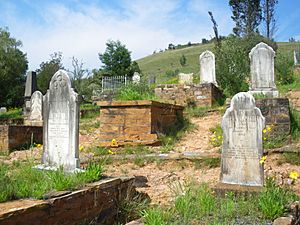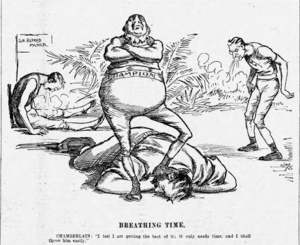Uitlander facts for kids
Uitlander, which means "foreigner" in Afrikaans, was a name given to foreign workers, mostly British, who came to the South African Republic (also called the Transvaal Republic) after gold was found there in 1886. These workers arrived during the big Witwatersrand Gold Rush. The fact that these foreigners had very few rights in the independent Boer Republics was one of the main reasons that led to the Second Boer War.

Contents
The Second Boer War
A huge amount of gold was found in the Witwatersrand area in 1886. Within just ten years, the number of Uitlanders (English-speaking foreigners) in the Transvaal was thought to be twice as many as the local Boer people. Most of these workers lived around the city of Johannesburg.
Why the Transvaal Government Was Worried
The government of the Transvaal, led by President Paul Kruger, was concerned about how this large group of new people might affect the country's independence. Almost all the Uitlanders were British citizens. If they were given the right to vote, it could have been risky. At that time, the British government wanted to control more land in South Africa. Giving Uitlanders voting rights might have created a powerful group that could help the British take over the Transvaal and turn it into a British colony.
Laws Against Uitlander Rights
Because of these worries, the Transvaal government started passing laws in 1890. These laws made it very hard for immigrants to get voting rights or become citizens. To vote, an immigrant had to have lived in the republic for fourteen years and be over forty years old. This effectively stopped most Uitlanders from having any real say in politics. This strict approach was often called "Krugerism."
Growing Unhappiness and the Jameson Raid
This policy, along with high taxes, made many Uitlanders very unhappy. Their poor treatment was used as an excuse for an event called the Jameson Raid in 1895. Cecil Rhodes, a powerful British politician, planned to invade the Transvaal. His idea was for this invasion to happen at the same time as an uprising by the Uitlanders in Johannesburg.
Dr. Leander Starr Jameson led the invading force. However, the uprising that was expected in Johannesburg never happened. Jameson's force was quickly defeated and arrested.
British Pressure and the Start of War
From 1897 onwards, two important British officials, Sir Alfred Milner (the High Commissioner for South Africa) and Joseph Chamberlain (the Secretary of State for the Colonies), used the denial of rights to the Uitlanders as their main argument against the Transvaal. They encouraged the Uitlanders to complain and pushed their demands on President Kruger's government. They even hinted that war might happen.
In the end, the British government's strong demands and President Kruger's refusal to change his mind led to the start of the Second Boer War in 1899.
After the War
When the Transvaal was defeated in 1902, it became a British colony. All people living in the Transvaal then became British subjects, so the term "Uitlander" was no longer used.
However, when a new liberal government was elected in Britain in 1906, control of the Transvaal was given back to the Boers.
See also
- Boerehaat
 | Leon Lynch |
 | Milton P. Webster |
 | Ferdinand Smith |


